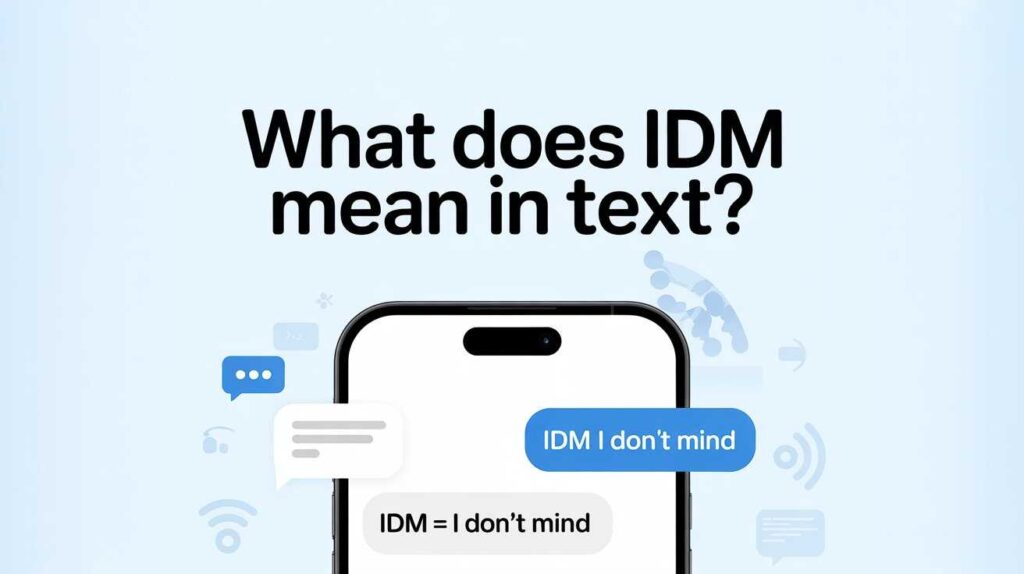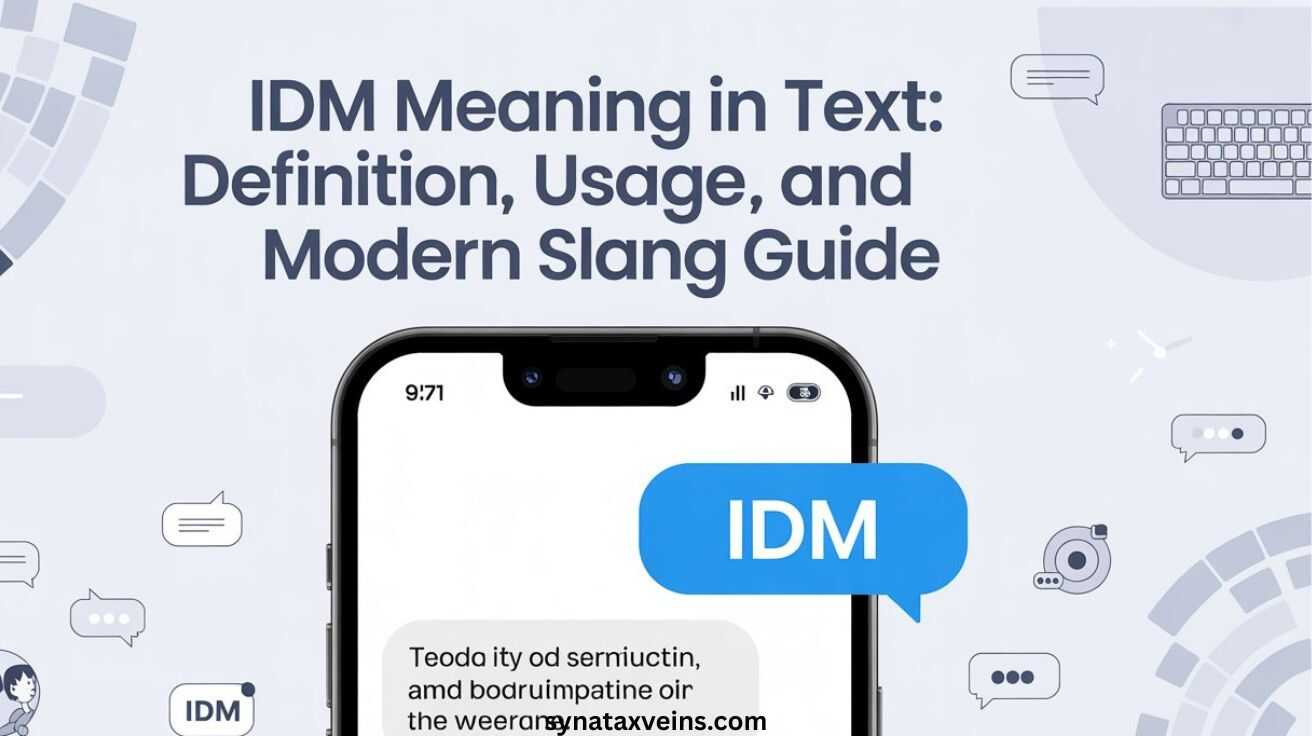Ever seen “IDM” pop up in a text or social media chat and wondered what it means? You’re not alone. In today’s fast-paced digital world, abbreviations like IDM dominate everyday texting and online slang. Typically, IDM stands for “I Don’t Mind,” a simple phrase used to express agreement, flexibility, or indifference. IDM MEANING IN TEXT
But depending on the context. whether in Instagram DMs, group messages, or casual slang its meaning can shift slightly. This guide breaks down the true meaning of IDM in text, explores its usage across platforms, and shows how to use it naturally in conversations without confusion.
What Does IDM Mean in Text?

In texting, “IDM” means “I Don’t Mind.” It’s a casual phrase people use to show they’re fine with a suggestion, option, or idea. For instance, if someone asks, “Pizza or burgers tonight?” and you reply, “IDM,” it simply means you’re okay with either choice.
In short, IDM reflects an easygoing and neutral tone, often used in digital chats and messaging discussions where the conversation is light and flexible.
👉 Example:
- Friend: “Want to watch a movie or play games?”
- You: “IDM, you pick!”
This abbreviation helps keep messaging smooth and effortless — perfect for the fast pace of online communication.
IDM Meaning in Slang
In slang or casual texting, IDM goes beyond “I don’t mind.” It can also convey a laid-back attitude or unbothered vibe. When used in relaxed conversations, IDM can sound friendly or even slightly indifferent depending on tone.
For example, saying “IDM whatever you choose” can mean you’re genuinely flexible — or that you’re not too invested in the decision. That’s why tone matters in text messages.
Some people also associate IDM with “Internet Dance Music” in online forums or music culture, but in general texting and social media chats, it nearly always means “I don’t mind.”
IDM Meaning in Text Message
When someone sends IDM in a text message, it often implies agreement without enthusiasm. The phrase helps keep a conversation polite but brief.
It’s especially common among friends or coworkers who prefer short, neutral responses. For instance:
- “Let’s meet at 8?” → “IDM.”
- “We can go to the park or mall.” → “IDM either.”
This abbreviation saves time while keeping the dialogue flow natural in digital communication.
IDM Meaning in Text Urban Dictionary
According to the Urban Dictionary, IDM primarily stands for “I Don’t Mind.” It highlights the term’s casual, nonchalant slang tone, popular in online communities, gaming chats, and group messages.
Urban Dictionary also notes that IDM’s interpretation can shift based on context, relationship, and message tone. For example, using IDM with a smiley 😊 feels friendly, but sending just “IDM.” with a period can sound cold or detached.
READ MORE >>> HMJ Meaning in Text: What Does It Really Mean?
Why People Use IDM in Text
People love using IDM because it’s:
- Quick – It shortens a full phrase into just three letters.
- Neutral – It avoids sounding too eager or too negative.
- Versatile – Fits both informal options and professional conversations.
In today’s digital chats and internet communication, efficiency rules. Abbreviations like IDM help maintain seamless chatting without losing meaning.
Table: Common Situations Where IDM Is Used
| Context | Meaning of IDM | Example |
|---|---|---|
| Friendly Conversation | Easygoing / Flexible | “IDM what movie we watch.” |
| Work Chat | Polite Agreement | “IDM switching meeting times.” |
| Dating or Casual Texts | Neutral Response | “IDM, whatever works for you :)” |
| Group Discussion | Cooperative Tone | “IDM, majority wins!” |
| Online Forums | Unbiased Opinion | “IDM as long as it’s fair for everyone.” |
Nuances of Tone When Using IDM
Tone changes everything. Writing “IDM 😊” sounds friendly and open, while “IDM.” may come off as indifferent or slightly cold. Always match your tone to the relationship and context.
For example, in business language, adding polite phrasing (“That works for me, IDM if we proceed”) keeps things professional. But in casual slang, “IDM haha” or “IDM tbh” feels relaxed and relatable.
This adaptability makes IDM a bridge between professional jargon and modern slang — versatile for both texting and workplace communication.
Professional Alternatives to IDM
In formal or workplace chats, avoid slang when clarity matters. Use these polite expressions instead:
| Situation | Professional Alternative |
|---|---|
| Approving a decision | “That’s fine with me.” |
| Offering flexibility | “I’m open to either option.” |
| Showing agreement | “I agree with your suggestion.” |
| Maintaining courtesy | “I have no preference.” |
Using these ensures a respectful language tone that fits business communication norms.
Casual Alternatives to IDM
If you want a fun or relaxed vibe, these casual slang terms work great:
- “No biggie.”
- “Sure thing.”
- “All good.”
- “Whatever works.”
- “I’m cool with that.”
These phrases keep your message friendly and informal, ideal for social media dialogue or texting discussions.
Polite Alternatives to IDM
For conversations that need a touch of courtesy or diplomacy, use:
- “That’s okay with me.”
- “I’m fine either way.”
- “I don’t have a strong preference.”
- “That sounds reasonable.”
Such phrases maintain a neutral phrasing tone — helpful for smooth interaction in mixed or formal groups.
How to Choose the Best Alternative
Selecting the right expression depends on the situation:
- Use IDM with close friends or peers.
- Use polite alternatives in semi-formal settings.
- Use professional options in business or client communication.
The key is to adapt your dialogue flow and tone to match the environment. It’s part of effective communication that builds clarity and respect.
10 Examples of IDM and Its Alternatives in Action
- “We can start at 9 or 10.” → “IDM either.”
- “Want coffee or tea?” → “IDM, surprise me.”
- “Let’s reschedule tomorrow.” → “Sure, I don’t mind.”
- “Is it okay if I join late?” → “IDM, go ahead.”
- “Which color should we pick?” → “IDM as long as it’s simple.”
- “Can we use another design?” → “That’s fine with me.”
- “Do you mind if I borrow it?” → “IDM at all.”
- “Pizza again?” → “IDM, pizza’s great.”
- “Change the topic?” → “All good.”
- “Want to text later?” → “IDM, whenever you’re free.”
These examples show how IDM blends neutral expression with courteous communication, making it a favorite in internet language.
Common Mistakes When Using IDM
- Using IDM in serious contexts – Avoid it in formal emails or professional documents.
- Overusing it – It may make you sound disinterested.
- Ignoring tone – Add emojis or clarifiers when chatting casually.
- Using with strangers – Some may misinterpret your neutrality as rudeness.
Always remember, context defines clarity. Use IDM wisely to maintain a positive tone and smooth conversation.
Frequently Asked Questions
What does IDM mean in a text?
In texting, IDM stands for “I Don’t Mind.” It’s a casual abbreviation people use to show they’re okay with something or don’t have a strong preference. For example, if someone asks, “Pizza or burgers tonight?” replying “IDM” means you’re fine with either choice. It’s common in friendly chats, social media messages, and online conversations where quick responses are preferred.
What does the IDM stand for?
The abbreviation IDM most often stands for “I Don’t Mind” in digital communication. However, it can also represent other phrases in different contexts, such as Intelligent Dance Music in the music industry or Internet Download Manager in technology. In texting or social slang, though, it almost always refers to “I Don’t Mind.”
Does IDM mean I don’t mind?
Yes — IDM means “I Don’t Mind.” It’s a simple and friendly way to express openness or agreement without sounding too formal. For instance, if a friend suggests meeting at 6 or 7 PM, replying “IDM” tells them you’re fine with either option. It’s short, polite, and widely understood in modern texting language.
Conclusion
IDM stands for “I Don’t Mind,” a versatile abbreviation used widely across texting, slang, and social media. It expresses flexibility, neutrality, and politeness fitting both informal options and business language when used carefully.
From friendly digital chats to professional communication, IDM keeps conversations short, clear, and respectful. Just remember: your tone matters more than the words themselves.

Arabella Rose, admin of [synatax veins], makes grammar simple and fun! With expert tips and clear advice, she helps you write with confidence and clarity. ✍️📚

